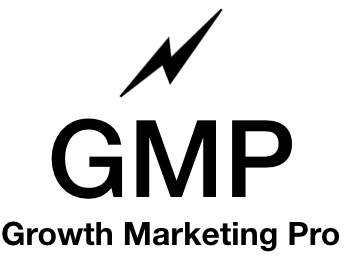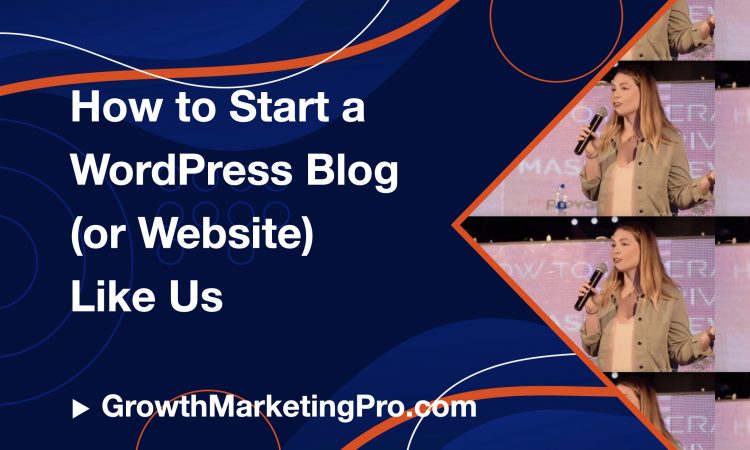- The Top 17 Direct Mail Companies - June 11, 2025
- The 11 Best Landing Page Builder Software Tools [2026] - June 11, 2025
- Instapage vs Leadpages vs Unbounce vs Clickfunnels - June 11, 2025
Between AI, Reddit, and more frequent algo updates, Google search engine optimization (SEO) is changing rapidly.
But SEO isn’t declining in effectiveness–it’s just evolving. The companies we work with–like SentinelOne, HiBob, and a public healthcare company with 17 million monthly organic visitors (sorry, NDA)–are all crushing it.
However, the strategies we’re using are shifting. And today, I’m sharing those with you.
Here’s what you’ll get in this post:
✅ 6 practical SEO tactics you can start using today.
✅ Real examples from startups and global brands.
✅ My step-by-step guide to ranking in ChatGPT and Reddit.
Let’s do it.
Looking for help with your marketing? Learn about our SEO services here.
Table of Contents
1. Productized pages are winning
The first trend we’re seeing more and more is the proliferation of so-called “product-led” pages in the search engine results page (SERP).
Some examples:
- Type into your Google search bar: “meta description generator.” As of today, 10 out of 10 results in the SERP are a productized page–one that enables you to enter a topic and get a meta description generated.
- Search: “calculate customer churn.” You’ll notice 5 out of 10 SERP results contain an actual customer churn calculator. According to Semrush, just 18 months ago only 2 results had a productized calculator, the rest were blog posts.
- Search: “create a recipes website.” 18 months ago, 10 out of 10 results in the SERP were blog posts. Today, 2 of the 10 are product-led generative AI pages. One is a recipe generator by dishgen and the other is a recipes website generator by Mobirise. Side note: both Reddit and Quora are in the top 10 now too.
Thanks to generative AI, the visibility of “product-led” pages in the SERP has accelerated drastically.
Why? Two reasons:
- Google wants to serve pages to Googlers that are the most useful. They know someone could go to ChatGPT and type in a few metrics and prompt it to “calculate my churn rate.” To compete, Google has to serve product-led pages to their searchers. Quite simply, this is where the puck is going–it’s a better experience to “do” something rather than just read about it.
- Product-led pages are easier and cheaper than ever to make. You can white label generative technology like ChatGPT and even make no-code widgets. Simply plop them on a webpage with an appropriate URL slug, meta description, and perhaps some written content and watch traffic roll in! In short, there’s just more product-led pages out there than ever before.
So, you need to embrace product-led pages. Blog posts won’t cut it for every type of search query. For some, sure – but much of the future real estate in the SERP will likely be taken up by useful, product-led pages.
The proof is in the pudding. We’ve helped this company grow traffic by almost 5x in the last 3 months by embracing product-led pages only. Sorry I can’t share more about them, but take my word for it, product-led pages are absolutely crushing it.
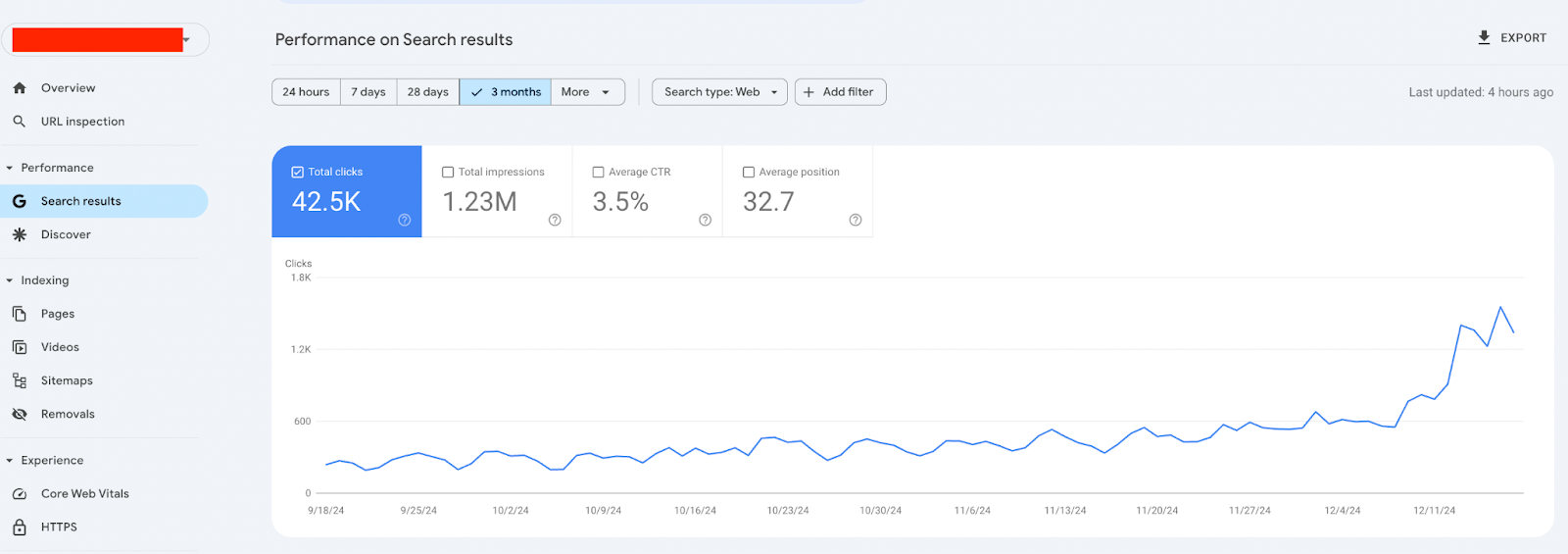
📚To summarize: Try product-led pages this year. It’s important to map to the right queries, but if you get them right, you have an SEO goldmine that should be more affordable than creating blog content.

🚀 Do you like what you see? We’re an elite growth marketing agency focused on the only metrics that matter – qualified leads and revenue for your business.
2. Ranking in ChatGPT
ChatGPT will have 1% of the search market share by 2025.
That doesn’t sound like a lot, but before dismissing this tip, consider that most of those searches are by highly-educated, technology early adopters. So if you’re selling a SaaS product for instance, ChatGPT will likely account for way more than 1% of your searches. For Hopscotch, a SaaS business I’m a part owner of, ChatGPT and Perplexity account for ~10% of our signups.
So, the question of how to rank in ChatGPT is probably on your mind this year.
Thanks to some good internet sleuthing and trial and error, we’ve figured it out… mostly.
Here’s the secret: Bing. Yes, that Bing.

While Microsoft doesn’t actually own 49% of OpenAI, as previously reported, the two companies are in cahoots.
And unsurprisingly, Bing results mirror ChatGPT results much of the time. Take for instance, the query “best hr software for small business.” BambooHR and Gusto are listed as the top two results in ChatGPT. Lo and behold, they’re the top two (non-listicle) results in Bing.
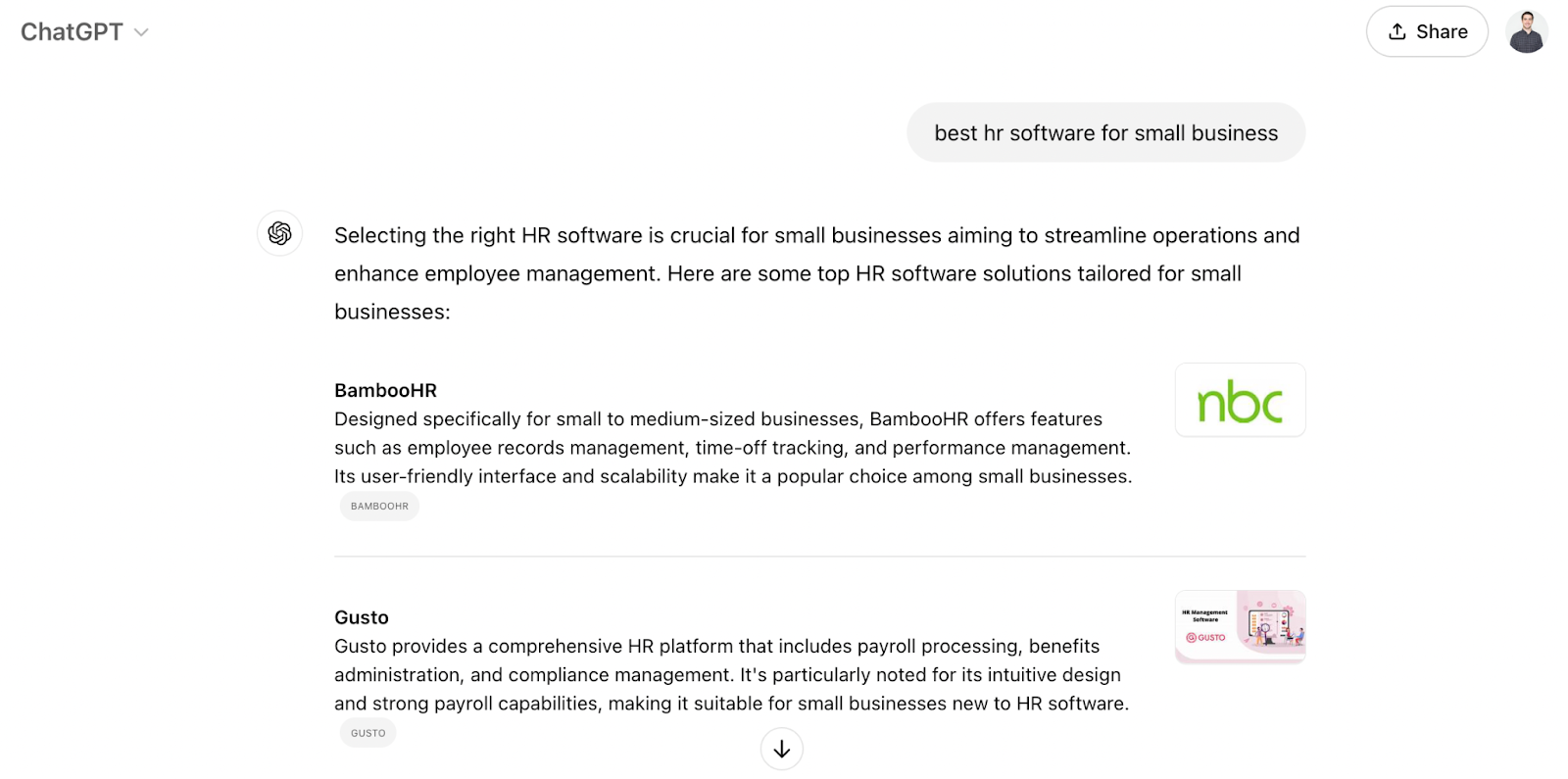
So, how can you rank in ChatGPT? By following Bing search best practices. Those are mostly the same as Google best practices, with a couple of unique exceptions:
- Bing loves Schema even more than Google. Add FAQs and other schema to your site where possible.
- Bing loves “exact match” queries. For instance, your blog post about “best HR software for small business” is more likely to rank in Bing, whereas Google is more likely to show a high authority, more general “best HR software” article. Please note: this shift is subtle and you may not notice this happening for every search query, but as a rule it does hold true.
- Bing seems to value backlink relevance over backlink domain authority. So to rank in ChatGPT, focus on more, relevant links rather than fewer, high authority links.
- Finally, use Bing’s Webmaster Tools. It’s like Google Webmaster Tools, but for Bing. Find areas of optimization that Bing values and apply them to your website.
One more thing: Anecdotally, we’ve also seen that being listed in “best of” listicles is helpful for ranking in ChatGPT. So it may be worth spending some time reaching out to top-ranking industry listicles in your space.
📚To summarize: In order to win with ChatGPT, you have to win with Bing.
3. Reddit is not going away – here’s how to harness it
If you’ve paid attention to search results over the last two years, you’ve probably seen how much Reddit has gained in the SERP.
Their organic traffic has effectively 7x’d in the last two years, according to Semrush.
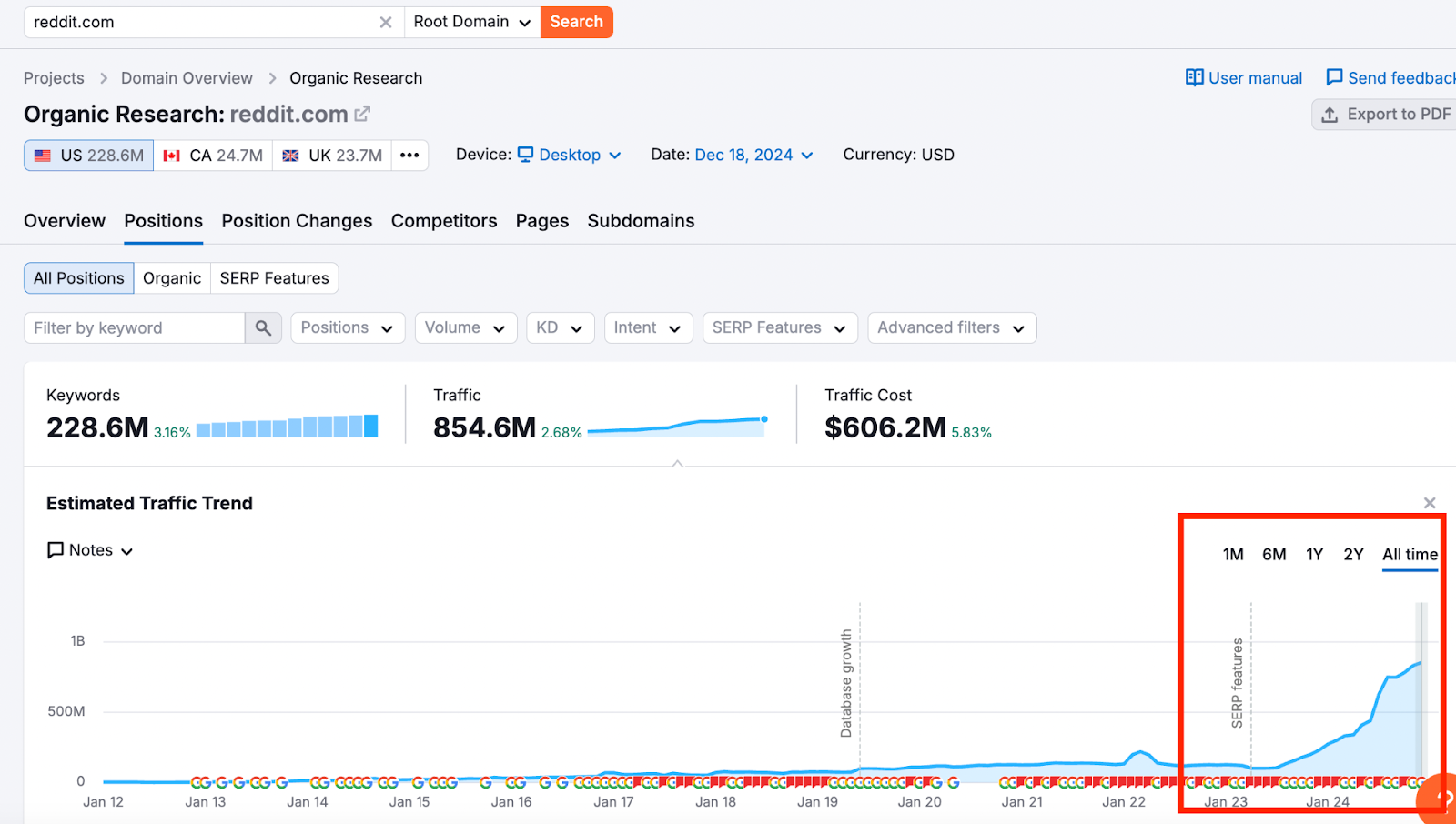
It makes sense. Reddit content is useful and “peer reviewed” by its very nature.
So, as with every search goldmine, SEOs are slowly but surely going to pollute Reddit with self-serving content. We could all cry about it, but I’d rather win the searches.
So how can you conquer Reddit SEO and get a piece of their search pie?
There’s a few ways, but this is how we do it:
- Head over to Semrush or Ahrefs and look at a page or query report. Key in your most important search topics and find the existing Reddit pages already ranking for the keywords you care about. Then simply mosey on over to those pages and engage! Be helpful and rarely salesy–treat Reddit posting like blog posting–quality over quantity. The only exception is if you’re a founder. Redditors actually love founders and we’ve found that founders can be pretty shamelessly self-promoting as long as they’re forthcoming about it.
- Use a “social listening” platform like F5Bot. Enter the keywords your business cares about and you’ll get alerts whenever they’re mentioned on Reddit. Then simply go and engage! This works because it’s fast and you’re engaging with active Redditors, rather than on stale threads.
- Create your own Reddit posts about the keywords and topics you care about and use Reddit’s domain authority to leapfrog to the top of the SERP. This is essentially like blogging. It’s the most “white hat” way to garner traffic on Reddit, but it will take a while. Google is mostly ranking Reddit posts that are older than 6 months. So it’s not like SEO publishing on your own site, which usually begins bearing fruit in a few weeks. It’s worth it, but it’s a long game.
- Create your own Subreddit. If you have an interesting product with an engaged following (think an investment platform like Arrived or a no-code app builder like Bubble) you can create a Subreddit and nurture your own audience, while also building organic search content. This is sort of a combination community-organic search play. It can be massive, but requires a huge time investment too.
Then of course there’s a few “grey hat” ways we boost all the engagement on these posts and replies. Unfortunately, I won’t be divulging all of those here. But if you’re interested in engaging, we should chat about our Reddit offering!
One hint I will give if you want to DIY Reddit organic growth: try a tool like BuyUpvotes.io. It’s a dangerous game because Reddit will most definitely ban accounts with suspicious activity, but it can work if done properly. Hint: work with us 🙂
📚To summarize: Leveraging Reddit effectively can solidify your brand’s online presence and funnel meaningful traffic to your site, making it an indispensable part of next year’s SEO toolkit.

🚀 Learn about our Reddit offering:
4. “Zero volume” searches
Bear with me on the next one because it’s anecdotal… but there’s something to it.
I love zero volume searches.
Zero volume searches are queries that don’t even show up in search tools like Semrush or Ahrefs. They’re the least competitive search terms out there and you’re making a bet that you’re in the early adoption curve for that search term.
I maintain that zero volume searches are becoming more important than ever for a few reasons:
- Google is valuing domain expertise more than ever. Even high domain authority sites like Forbes (who lost half its traffic in the last algo update) are getting smoked for trying to rank for “anything and everything.” Google knows you can’t be the authority on “auto parts,” the “best lawyer in New York,” and the “best CRM for small businesses.” The earlier you rank for a search query, the more likely they are to see you as an authority in that space–not just a bloodsucking SEO 🙂.
- We all know that AI is making it super easy to essentially copy existing information on a topic. There’s a multitude of tools that make content creation easier than ever using AI (we even built and sold one of them). But Google’s not stupid. The Google algo indexes and dates all websites and webpages that it crawls, so it can tell who has the original content and who is the copycat. Original content is more important than ever–because original content adds value to the Google ecosystem.
The concept has been around for a while, and I’ve seen sites I own or work on rank fast with queries that have no search volume today.
Here’s a client who just saw explosive traffic growth from a very particular (albeit seasonal) zero volume search query.

Here are three ways to find zero volume searches:
- Think about your own experiences: Often, the best ideas come from personal frustrations or problems you’ve solved that others in your audience are likely facing. These insights can lead to unique, high-performing content. Sometimes “gut feel” and some industry expertise is the first place to start.
- Explore forums and community platforms: Browse places like Reddit, Quora, industry-specific Slack groups, niche Facebook communities, or even TikTok. These platforms are hotbeds for emerging questions and discussions that aren’t mainstream yet.
- Leverage tools like Exploding Topics: Exploding Topics identifies trending subjects before they peak. Plug relevant ideas into your content strategy to get ahead of your competitors.
- Mine Google’s autocomplete and ‘People Also Ask’ sections
Start typing a broad term in Google’s search bar and pay attention to autocomplete suggestions or related queries. These can lead you to nuanced, untapped ideas that aren’t obvious in traditional keyword research tools. - Use internal search data: Check your own website’s search bar (if you have one) or customer support communications. The phrases visitors type in could reveal niche queries with zero reported volume that are crucial to your audience. Copy and paste them all into ChatGPT and ask it to help you sort and summarize.
📚To summarize: Zero volume searches are an SEO goldmine. Particularly if you’re working with a low domain authority site, you should make them part of your strategy.
5. Revise and expand your link building
This one is sort of boring and you’ve probably seen it before, but it’s 100% true and you’d be a fool to ignore it.
In 2025, the SEO world is witnessing a paradigm shift: the quality of links now matters more than ever, far outweighing the quantity. This transformation is driven by several developments at Google and broader changes in the digital ecosystem.
Here’s why this evolution is happening and what it means for your link-building strategy:
- Google Is devaluing spammy links: At SERPCon 2024, Google’s Gary Illyes emphasized that “we need very few links to rank pages,” and that links have become less significant over time (source: SER). While he later softened the statement, it reflects Google’s ongoing battle with spammy and manipulative link-building tactics. Updates like the June 2024 Link Spam Update, powered by AI-driven SpamBrain, specifically target low-quality or bought links, rendering many traditional strategies like guest posting on low-value sites ineffective.
- The Helpful Content Update highlights the importance of value: Google’s March 2024 Helpful Content Update emphasized rewarding sites that provide genuinely useful and unique content while penalizing those created solely for link-building or monetization. Many “guest post” and affiliate-heavy sites saw massive traffic drops, with only 6% of analyzed guest post sites still considered high quality. This reinforces the need to secure backlinks from authoritative, value-driven websites rather than link farms or marketplaces.
- Authoritative and relevant links now reign supreme: Insights from the 2024 Google API leak confirmed that the algorithm increasingly values quality over quantity. Authority, relevancy, authorship, and freshness of linking content play a central role. Links from top-tier news outlets, recognized industry sites, or brands with high trust signals are now significantly more impactful than sheer backlink volume.
- Generative AI demands fresh, credible sources: The internet is polluted. You didn’t need me to tell you that–but links cut through the noise unlike pretty much any other part of SEO. You can’t “fake” a link from the New York Times. The rise of Google’s AI Overviews in 2024 underscored the importance of feeding trustworthy, proprietary data into large language models (LLMs). AI models are expensive to run and a shortcut to finding the best, most relevant information is by citing sources that are linked to by other credible sources.
So how can you get authoritative links this year? I could spend the next 2,000 words telling you how, or you could read my post: The 25+ Best Ways to Get Backlinks. (We also do link building via our agency!)
📚To summarize: The mantra this year is clear: less is more—if it’s done right. Brands should aim for fewer but higher-quality links from trustworthy, authoritative sites that align closely with their industry and audience.
6. Google My Business proliferation (plus a list of 140+ local citations)
You might think this doesn’t apply to you.
But Google My Business (GMB) applies to a lot more businesses than you might think. Google My Business has become indispensable for mastering local SEO — and it comes up for many different search terms, not just for restaurants and local services.
I mean, look how much space the map pack takes up for the search “SEO agency.” You wouldn’t think that search would trigger the local map.
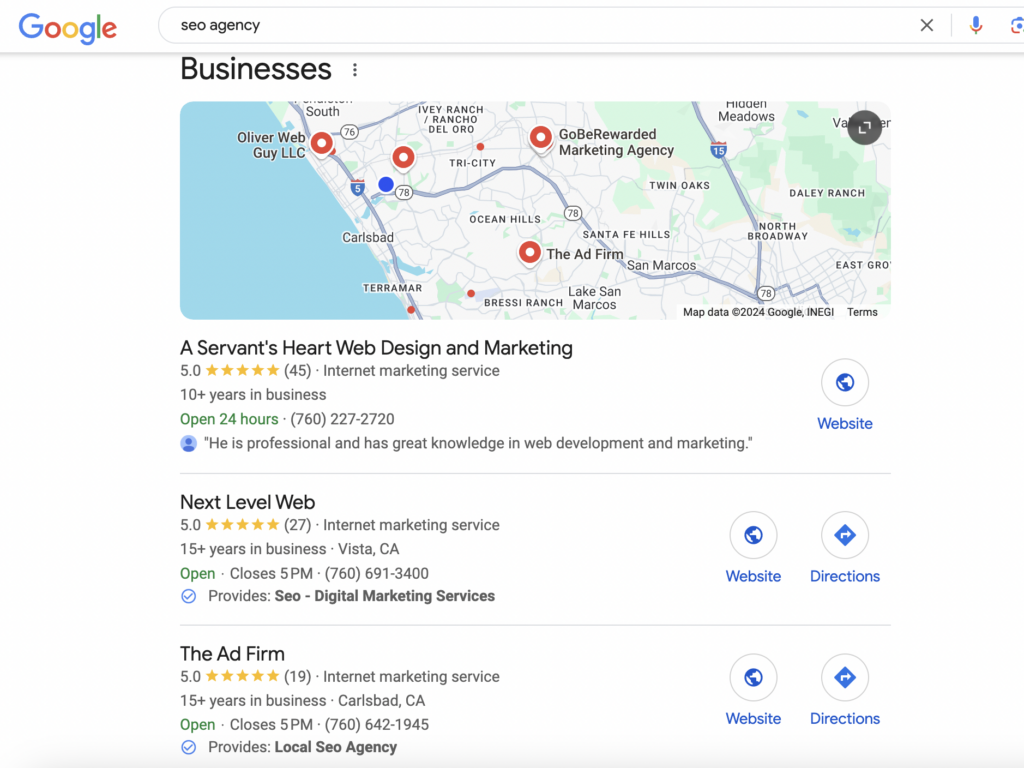
In 2025, GMB is more valuable than ever before, providing a degree of authenticity and local relevancy that is critical in the eyes of Google.
This is partly because GMB remains resilient to manipulative black hat techniques, allowing Google to trust the listings it showcases. In short, it’s tough to cheat Google My Business.
Here’s the process for ranking in Google My Business, plus a few tips to make your listing crawl to the top of the local pack:
- Make your GMB profile here
- Google will then make you verify your location by video or by mail
- Once you have a profile, stuff your listing with all the relevant keywords. Do a little keyword research and find out what people are searching — add those keywords and more. Make your listing beefy!
- Make sure your GMB address matches the address in the footer of your site, as well as all local citation sources (Yelp, Facebook, etc.). Here is a list of 140+ local citations you need to take care of.
- Engage with clients or customers and incentivize reviews. Customer reviews are the single most important ranking factor for GMB.
- Make sure to add images to your listing — Google cares.
- Extra credit: you and some of your friends should search directions to your address. Believe it or not, it’s a local ranking factor.
If you’re looking to supercharge and scale your local listings, you’ll need to work with an individual or agency who can proliferate your listings. It’s legal and yes, it works!
📚To summarize: A well-maintained Google My Business profile not only elevates your search rankings but also establishes your brand as a leader in your local community… and it can be scalable with some grey hat tactics.

🚀 Learn about our SEO offering:
Your 2025 SEO success
As we step into 2025, staying ahead in the SEO game requires a strategic blend of innovation and adaptation. Whether it’s harnessing the power of Google My Business, delving into Reddit’s vast potential, or redefining link-building practices, the key is to remain agile and informed.
By employing these advanced tips thoughtfully, businesses can not only dominate search rankings but also build a resilient online presence ready to tackle the challenges and opportunities that come with the ever-changing digital landscape ahead.

🚀 Do you like what you see? We’re an elite growth marketing agency focused on the only metrics that matter – qualified leads and revenue for your business.
